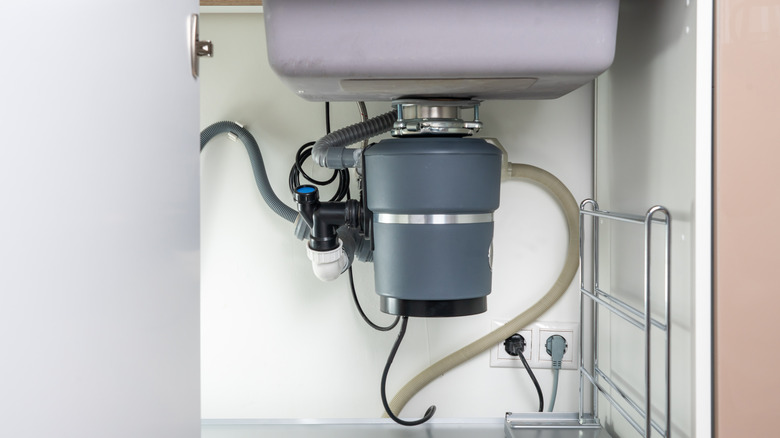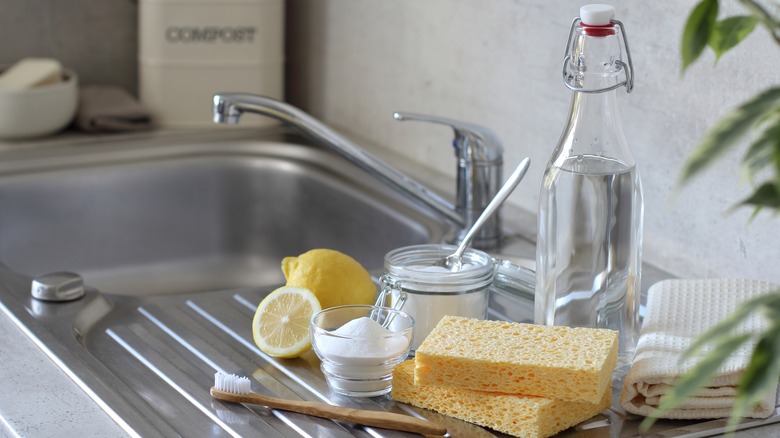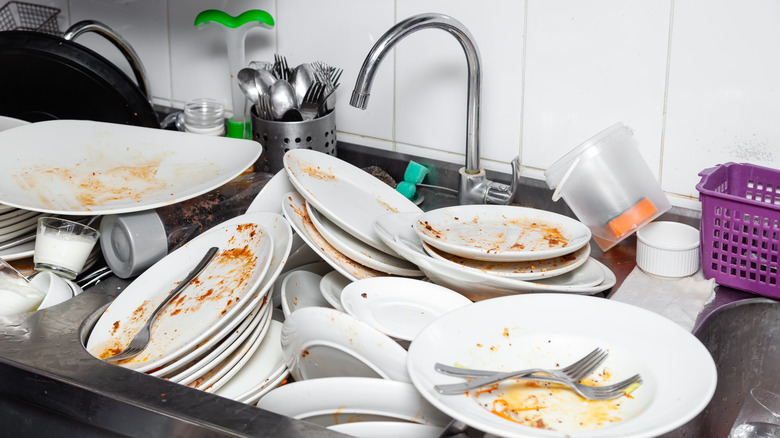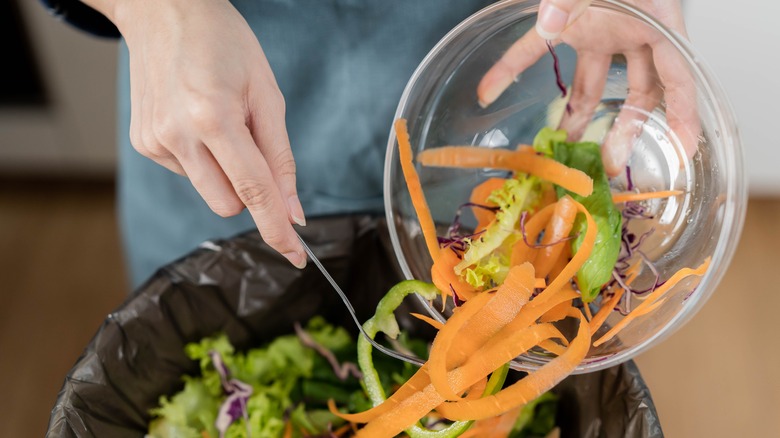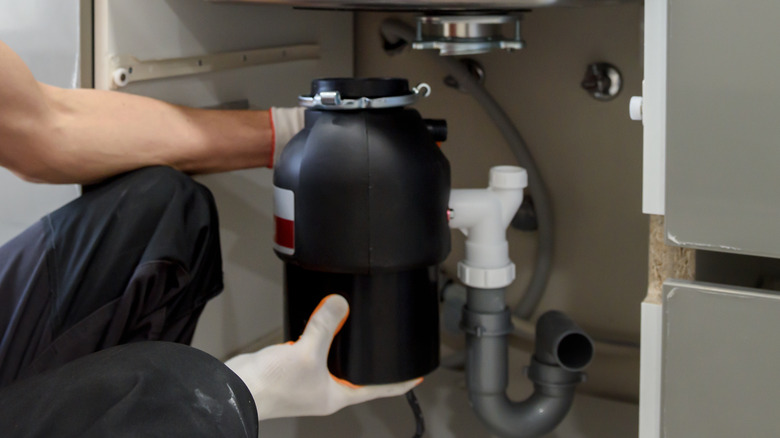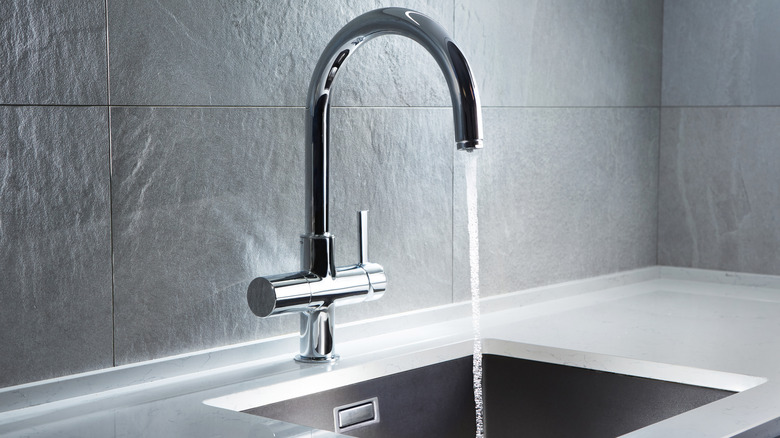5 Simple Tips For Keeping Your Garbage Disposal Running Smoothly
While your garbage disposal probably isn't the most expensive appliance to fix or replace in your kitchen, few homeowners welcome the telltale signs that accompany a faulty garbage disposal. From the worrying noises that occur while it's grinding to a lack of grinding action in the first place, there's no shortage of unfortunate fates that can befall a garbage disposal that isn't properly cared for. Luckily, just a little bit of common sense and routine maintenance can help ensure that your garbage disposal runs flawlessly for as long as possible.
According to Magnolia, the average garbage disposal should give you about a decade of reliable service before it needs to be replaced, although heavy-duty models are likely to outlast most budget-friendly options on the market. To maximize your unit's lifespan and keep it running smoothly, be sure to routinely clean it, understand its limits, be aware of what enters your sink, and make timely repairs when necessary.
Clean your garbage disposal
Some of the most common issues with garbage disposals are caused by a lack of cleaning. If you've ever dealt with a garbage disposal that gets clogged frequently or smells terrible, a thorough cleaning is probably all that is needed. According to Diamondback Plumbing, to deep clean your garbage disposal you can use baking soda, vinegar, and boiling water to loosen up any hard-to-remove grime. There are also a number of quality garbage disposal cleaners that you can buy at the store, although some of these are better for daily cleansing than a heavy-duty deep clean.
The best way to prevent your garbage disposal from becoming clogged or smelly, according to Express Sewer & Drain, is to let cool water run for a little while after using it. The less food buildup you allow in your garbage disposal, the less likely you are to deal with troublesome clogs and odors. For this reason, many homeowners prefer to clean their garbage disposal on a weekly basis, especially if they use it regularly.
Know your garbage disposal's limits
Not all garbage disposals possess the same grinding capacity. As such, it's important to know your unit's features and limitations in order to keep it in working order. Of primary importance is the amount of horsepower (HP) that your garbage disposal's motor possesses. According to Home Depot, although a ½ HP garbage disposal is the minimum requirement recommended by most manufacturers, these less powerful units are far more likely to jam or break when faced with demanding food scraps. Additionally, lower horsepower garbage disposals are unlikely to be able to grind up hard food scraps like chicken bones, or large quantities of softer food scraps all at once.
If you want to keep your garbage disposal running for as long as possible, you might need to change the way you use it. For instance, if you have a large family, it's probably not a good idea to grind up everybody's food scraps at once, since this can overburden and jam your unit. Likewise, if your unit sports a less powerful motor, you should opt to throw certain waste (such as chicken bones) in the trash can instead of your garbage disposal.
Be careful what goes into your garbage disposal
There are quite a few things that should never go in your garbage disposal. However, some food waste, such as fibrous vegetables or coffee grounds, takes homeowners by surprise since they seem fairly unlikely to cause an issue. According to Service Plus Plumbing, however, vegetables such as celery and asparagus can actually shut your garbage disposal down for good due to their long, resilient fibers wrapping around your unit's grind chamber. You'll also want to avoid disposing of fruit pits since these are often too hard for your garbage disposal to deal with.
While most people know not to drain grease down their kitchen sink, many dispose of egg shells and coffee grounds in their garbage disposal. However, both of these food waste products can do a number on your garbage disposal over time, especially if you don't clean out your unit on a regular basis. Be sure to read your garbage disposal's user manual so that you have an understanding of what food scraps you can and can't dispose of.
Troubleshooting your garbage disposal
One of the best ways to maximize your garbage disposal's lifespan is to know how to fix it when things go wrong. Luckily, many basic garbage disposal issues are easy to troubleshoot, even if you're not an experienced DIYer. For instance, jams are one of the most common garbage disposal issues that cause homeowners to call a plumber. However, according to Insinkerator, a jammed motor can often be rectified by simply unplugging your garbage disposal, then using the Allen wrench that came with your unit. Usually, a few turns in the hole at the bottom of your garbage disposal with the wrench will be enough to dislodge what is jamming your unit.
Of course, sometimes fixing a faulty garbage disposal takes more effort. Per Home Depot, it's worthwhile to learn how to troubleshoot your unit's electrical components in the event that it's not powering up. Sometimes, this will be as simple as hitting the reset button, however, you may also need to check your circuit breaker and the device's wiring to ensure a safe electrical connection.
Use cold water
Some homeowners believe that their garbage disposal should always be used while running hot water from their kitchen faucet. While this may make sense at face value, it's actually a huge misconception. Since hot water temporarily transforms solid fat into a liquid state, it can clog up your plumbing by allowing fat to coagulate in your pipes. Hot water can also cause fat to adhere to your garbage disposal's grind chamber, explains Roto-Rooter, which can be a real pain to clean. Using cold water while running the garbage disposal, on the other hand, allows fat to be in a solid state so that it can be ground by the disposal. This allows it to be reduced to smaller chunks which are easier on your pipes.
In addition to cold water, it's always a good idea to use common sense where your garbage disposal is concerned. Running it all the time will cause it to age prematurely as its motor wears out and its grind chamber slowly corrodes. Homeowners who use their garbage disposal less often will usually get more years of use out of it than homeowners who run it for hours every day. So, try to only use your garbage disposal when it makes sense — and never grind up globs of fat, banana peels, or other food waste that's likely to cause damage.
